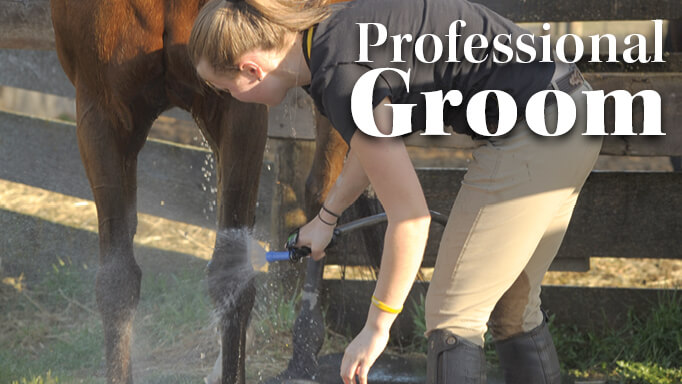The road from horse-crazy kid to serving as a groom at the Olympics is a long one, but FEI grooms Denise Moriarty and Meghan Button share their advice on how to begin your journey behind the scenes.
It goes without saying that work ethic is among the most desirable traits when assessing your suitability to pursue a career as a groom. Button, who has been Erynn Ballard’s groom for eight years, explains that communication skills and the ability to work well in a team are equally important. “You need to have time management skills, but I also really can’t say enough about work ethic,” she says. “Ideally, you should be a self-starter; there is always something to do and there is no job too small or outside of your job description.” She also stresses the importance of honesty. “Owning up to mistakes and keeping the lines of communication open is absolutely crucial, because every trusting relationship depends on honesty.”
Grooming professionally is more of a lifestyle than a career. Long hours do not necessarily beget a large paycheque; however, what is lacking in bank account balance may come in the form of experiences, perks, and fulfilment from the job itself. Moriarty, who has been Kent Farrington’s groom for six years, says that in addition to the education gained by being surrounded by the best of the best, you get to live your passion. “Passion for the job is the reason most of us do it at this level. Building a bond of trust and respect not only with the horses, but your rider as well, is very rewarding. A big perk is getting to travel the world and getting paid to do it, as is seeing new places and meeting new people – some who will become lifelong friends.”
Button cautions that those expecting a traditional Monday-to-Friday 9-5 job need not apply. She also recommends being honest about your abilities when seeking a position. “I think new grooms truly don’t understand the work it takes. So many have degrees in equine management and expect to have their pick of jobs at high pay. In reality, you will make money when you deserve it,” she explains. “You need to prove your reliability and work ethic. I also think that people really underestimate your need to be gritty; if you wake up and don’t feel one hundred per cent, it doesn’t matter – you have to show up for the horses.”
Moriarty suggests approaching potential employers with an open mind and a willingness to learn. Recognize that it takes time to integrate into an already-established operation and develop as a member of the team. “Put yourself out there and be open to new opportunities,” she says. “I think it is important to be honest about your level of skills and with the things you feel comfortable and uncomfortable doing; for example, bandaging and injections. Be honest about the experience that you have, but be sure potential employers also know that you are adaptable and that you can work in a different system with different ways of doing things.”
Button suggests you watch, learn, and ask questions. “Show up on time for your interview and dress appropriately. Don’t be shy; everyone in this industry is busy almost all the time, so be clear about your experience and ask questions during the interview to ensure a good fit. Start from the bottom and work your way up. There is a sense of community among grooms and if you work hard and earn respect, almost anyone will help you along the way. You have to be in it for the horses; becoming a top-level groom is something that happens only with dedication and hard work. It can be extremely rewarding, but none of that matters if you don’t wake up in the morning and still love horses.”
Moriarty’s words of wisdom for those with aspirations of grooming at the highest levels of the sport? “I wish someone had told me it’s more stressful than it looks,” she says, laughing. “It’s a position that is glorified a bit, but it’s a lot of work and responsibility and you shovel manure just like any other groom. I also don’t think a lot of people understand the responsibility and consequences if things go wrong. Having the wrong number can get your rider eliminated or disqualified; if this is the qualifier for the grand prix, or the grand prix itself, you are, for want of a better word, screwed. You, your rider and your horses are monitored by stewards twenty-four hours a day while at a show, so it’s important that everything is done correctly. In regards to FEI drug testing, it’s essential to know the rules and be careful. Something as simple as leaving your morning coffee too close to your nosey horse could result in your horse ingesting a positive substance; your horse testing positive for a prohibited substances can result in a lengthy suspension for your rider.”
But despite the long hours and pressure, Moriarty concludes, “It’s amazing seeing your horses doing their best to succeed in the ring and knowing you play a part in that. When you are with the horses as much as we are, you create a strong relationship with them. The horses truly come first; love what you do and the rest will be easy.”

